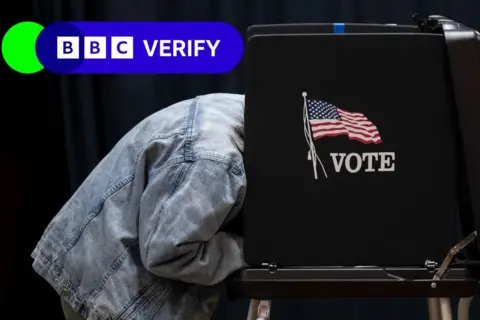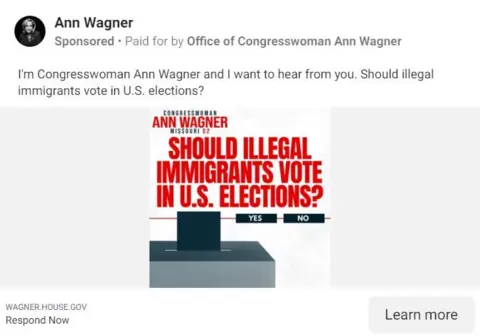 Getty Images
Getty ImagesDonald Trump and his Republican allies have repeatedly claimed that the Democrats are planning to get illegal immigrants to vote in the US election.
“Our elections are bad, and a lot of these illegal immigrants coming in, they’re trying to get them to vote,” Trump said during the presidential debate with Kamala Harris.
BBC Verify has identified more than 100 paid-for ads on Facebook and Instagram posted by Republicans since the start of September focusing on the issue.
It is illegal for a non-US citizen to vote in a national election, but studies suggest cases of this actually happening are very rare.
What laws are in place to stop illegal immigrants voting?
The Illegal Immigration Reform and Immigrant Responsibility Act of 1996 prohibits non-citizens – which includes illegal immigrants – from voting in federal elections.
The punishment includes a year in prison, a fine, and possibly deportation.
Every state is required to use a common registration form which requires people to confirm they are US citizens, under penalty of perjury for false claims, but does not require documentary proof.
“That first step of having to tick a box saying you’re a citizen to register to vote is a huge deterrent for illegal immigrants, as it’s hugely risky to lie,” says Jasleen Singh, a voting expert at the liberal policy think tank Brennan Center for Justice.
In many states, voter rolls are cross-referenced with citizenship and immigration services, death certificates, and postal records to make sure that people who are non-citizens, dead, or live out of state are not registered to vote.
“At the polls, there’s a list of eligible voters, and if a non-citizen turns up, they’ll be turned away or told to cast a provisional ballot which will only be accepted if they can provide proof of citizenship,” says Prof Ronald Hayduk, a voting rights expert at San Francisco State University.
Non-citizens are not allowed to vote in state-wide elections either.
However, some municipalities in California, Maryland, Vermont and Washington DC do allow them to vote in certain local elections, such as for school boards.
What evidence is there that illegal immigrants vote?
A number of studies, both from conservative and left-leaning organisations, suggest instances of illegal immigrants voting in US federal elections are very rare.
One by the Brennan Center for Justice interviewed 44 election officials who worked across 12 states during the 2016 election.
It found that out of 23.5 million votes counted in these states, an estimated 30 suspected incidents of non-citizens voting were referred for further investigation.
That’s about 0.0001% of all votes cast.
An analysis of a database which collected election fraud cases between 1999 and 2023 by the Heritage Foundation, a conservative research group, found 77 instances of non-citizens voting.
A number of other reports, including by the Cato Institute, a conservative think tank, entitled ‘Non-citizens Don’t Illegally Vote in Detectable Numbers’, come to similar conclusions.
“According to many sources of evidence, the number of non-citizens who vote in elections is very small,” says Walter Olson, a senior fellow at the Cato Institute who’s written a number of reports on voter fraud.
“It’s not zero, some people slip through the cracks for various reasons, but it’s nowhere near at the level to impact the outcome of an election.”
What evidence do Republicans cite?
The Safeguard American Voter Eligibility (SAVE) Act, a Republican proposal which would require people to prove their citizenship when registering to vote, has been rejected in the House of Representatives.
Republican lawmakers continue to push for more citizenship requirements.
“We have a number of states who have done audits of their voter rolls and found thousands of non-citizens,” the lead Republican in the House, Mike Johnson, told CNN.
He highlighted Ohio, Pennsylvania and Georgia – three states where polls show a tight race between Trump and Kamala Harris.
In Ohio, a review called for by Republican officials in the state, found that out of about eight million registered voters, there were 597 cases which have been referred for “further review and potential prosecution” for non-citizens registering to vote.
In Pennsylvania, a glitch with electronic touchscreens in state drivers’ licence centres wrongly showed non-citizens the option to register to vote while getting new or updated licences.
This glitch was in the system between 2006 and 2017, and has since been resolved.
In 2017, Pennsylvania state election officials said non-citizen immigrants might have cast 544 ballots illegally out of more than 93 million ballots in elections dating back to 2000.
In Georgia, a review of voter rolls in 2022 found 1,634 people “had attempted to register to vote” but “were not able to be verified”, out of about seven million registered voters.
“Voter fraud and illegal immigrants voting is so rare that this myth is to sow doubt in election integrity and lay the groundwork to cast doubt on the election outcome,” argues Ms Singh.
Republican ads sow further doubt
BBC Verify has identified 118 paid-for ads posted on Facebook and Instagram since 1 September by Republican candidates or by Republican political groups which claim widespread voter registration of non-citizens, or which raise the question of whether non-citizens should be allowed to vote in elections.
The ads we identified were shown between 7.8 and nine million times on the platforms.
One – which had more than 2.4 million views – invites users to participate in a poll with the question: “Should illegal immigrants be allowed to vote?”
Another ad posted by Congresswoman Ann Wagner, with more than 900,000 views, invites users to answer the same question.
 Facebook
FacebookAdditional reporting by Maryam Ahmed.








